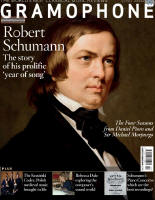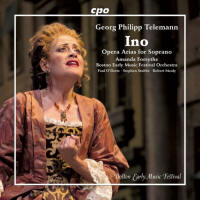Texte paru dans: / Appeared in: |
|
 |
|
|
Amanda Forsythe and the orchestra of the Boston Early Music Festival conjure exceptional stylish elegance and theatrical vitality in the flowing sequence of orchestrally accompanied recitatives, ariosos, dances and arias. Forsythe’s declamatory ‘Ungöttliche Saturnia’ has a hint of steely vexation at the unjust gods; the ensuing orchestral recitative is alive to every nuance in Telemann’s illustrations of the poetry. Ino’s amazement at being borne safely aloft on the waves begins in a gentle ballet with flutes that develops seamlessly into recitative and arioso. After a genteel dance of Tritons, Ino metamorphoses into a goddess in a galant aria delivered with an audible smile (‘Meint ihr mich, ihr Nereïden?’). In conclusion, she gives thanks to Neptune in the proto-classical ‘Tönt in meinem Lobgesang’; the orchestra’s pulsing horns, light flutes and polished strings, and Forsythe’s rapturous ornamentation, are nothing short of marvellous.
There is also an intelligent cross-section of arias and scenes from four of Telemann’s operas. Agrippina’s ‘Rimembranza crudel’ (added to the 1710 revival of Germanicus) conveys heartbreak at being ordered away to safety by her husband; Forsythe’s contoured phrasing and pianissimo high register are matched beautifully by contrapuntal strings and plaintive oboes. Two scenes from Emma und Eginhard (1728) illustrate the predicaments of Charlemagne’s daughter Emma, who tries to run away with her lover (the disapproving emperor’s secretary): her simile comparing herself to an ensnared deer (‘Je mehr, dass ich mich widersetze’) is a cheerful hunting aria featuring an elaborate horn obbligato played expertly by Todd Williams. A Vivaldian combination of soft strings, a pair of bubbling sopranino recorders and Forsythe’s crystalline limpidity conveys the nature imagery of soothing zephyrs, a waterfall and a pair of nightingales in Fulvia’s ‘Mischt, ihr muntern Nachtigallen’ from Flavius Bertaridus (1729). In contrast, there is petulant playfulness in the nymph Elpina’s witty passepied vowing that the shepherd Laurindo will regret having scorned her (‘Lache nur, du Tigerherze!’,
Der neumodische Liebhaber Damon, 1724). Another satisfying element is interpolations from an overture-suite in D major composed for the Landgrave of HessenDarmstadt in 1763; its first movement functions perfectly as a makeshift overture to Ino. Covering a span of more than six decades in the life of such a prolific and talented composer is no mean feat. The sheer variety and high quality of music on offer are served wonderfully by Forsythe and the classy Bostonian band.
|
|




